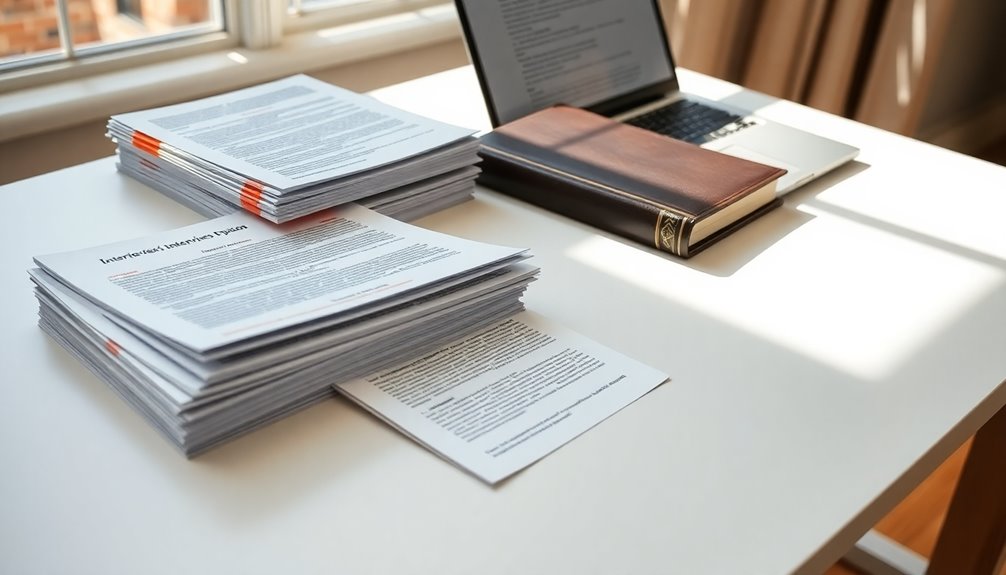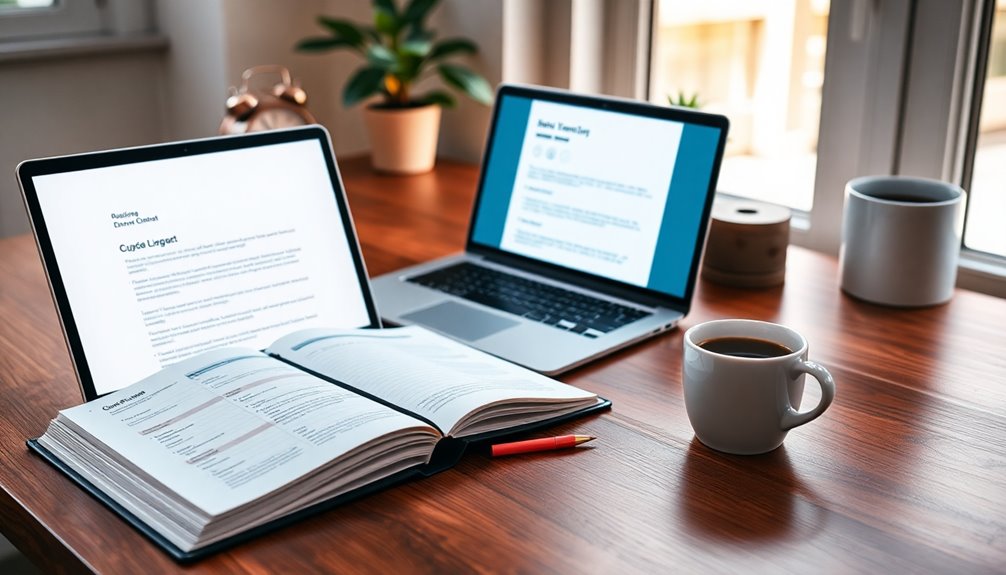Mastering interview papers with the APA Style Guide is vital for presenting your research effectively. Start by structuring your document correctly, including a title page, main body, and references. Use Times New Roman font, double-space, and set one-inch margins. Your abstract should summarize the key elements concisely, while in-text citations are necessary for quotes and paraphrased material. Properly format personal communications, like interviews, to enhance credibility. Following these guidelines not only validates your claims but also helps communicate unique insights clearly. Stick with it, and you'll uncover more essential tips and techniques along the way.
Key Takeaways
- Ensure your interview paper includes a clear title page, main body, and references section, adhering to APA formatting guidelines.
- Use 12-point Times New Roman font, double-spacing, and 1-inch margins for a professional appearance.
- Craft a concise abstract summarizing the purpose, methods, results, and conclusions of the interview insights.
- Format in-text citations for personal communications by including the interviewee's initials and date of the interview.
- Alphabetize your references section by the author's last name, excluding unpublished interviews, to maintain proper citation practices.
Understanding Interview Papers

Understanding interview papers is essential for anyone looking to harness the power of firsthand insights in their writing.
These papers are research-based essays that draw evidence from unpublished conversations with individuals who often possess expertise in relevant fields. You'll find interview papers commonly used in journalism, where unique insights can make a significant impact.
The quality of your paper hinges on the questions you ask and the comfort level of your interviewees. In your introduction, clearly explain why the interview was necessary and connect it to your thesis statement, emphasizing the value of the insights gained.
Significance of APA Format
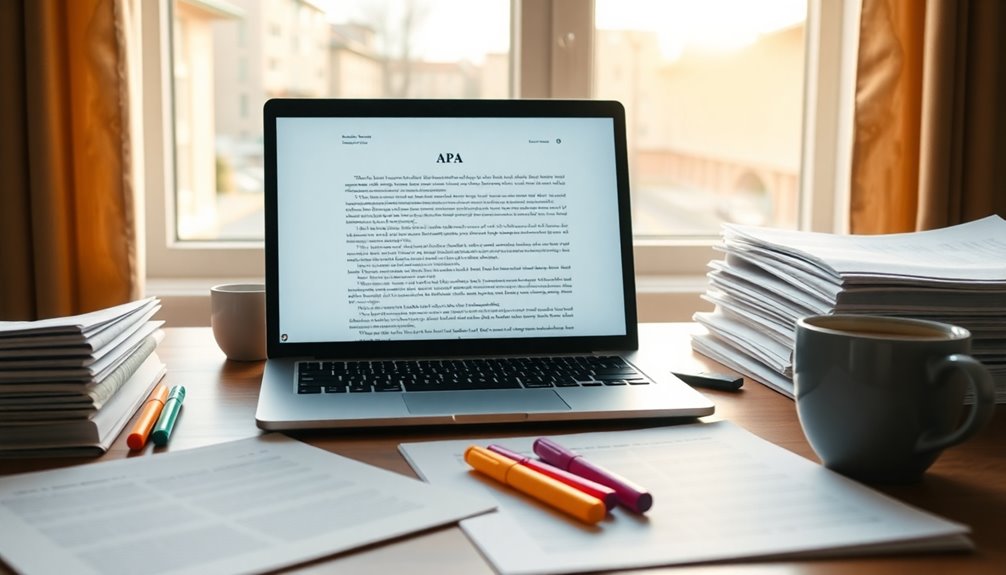
When crafting an interview paper, adhering to the APA format is essential for presenting your work professionally and credibly. It establishes a familiar structure that readers recognize, making it easier for them to follow your findings.
By using APA, you enhance your credibility, as it shows you respect academic standards. This format promotes clarity and consistency, which is vital when citing interview material. Accurate citations validate your claims and help avoid plagiarism, ensuring your work stands up to scrutiny.
Additionally, using APA helps you effectively communicate your insights while acknowledging the expertise of your interviewees. Overall, mastering APA format not only elevates your paper but also contributes to a greater understanding of your research.
Document Structure and Setup
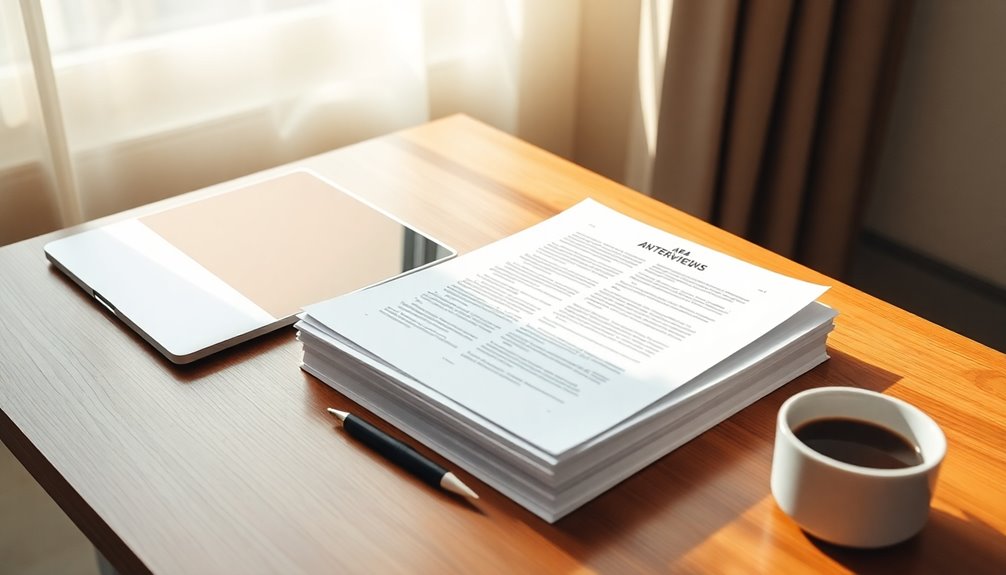
How do you guarantee your interview paper is well-organized and meets academic standards?
Start by setting up your document according to APA guidelines. Your paper should include a title page, main body, and references section. Use a readable font like 12-point Times New Roman, double-space your text, and maintain 1-inch margins.
The title page should clearly state the subject and your name. In the main body, structure your content into clear sections, ideally addressing one question per paragraph.
Finally, list your references, alphabetizing them by the author's last name. Remember, you don't need to include unpublished interviews in this list, but make sure you follow citation rules throughout your paper to uphold academic integrity.
Crafting Abstracts and Summaries
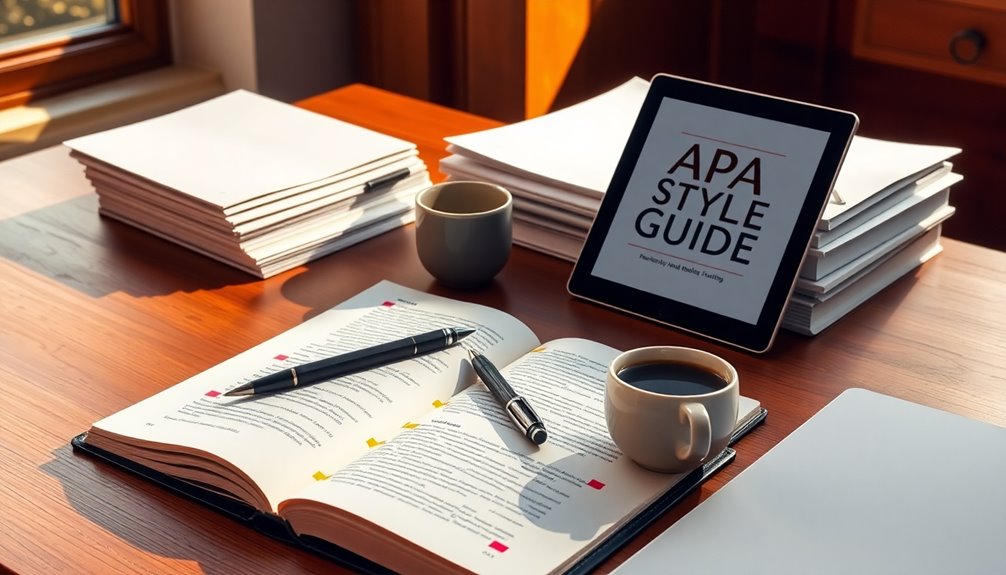
Crafting an effective abstract is essential for summarizing the key elements of your interview paper. Focus on the main purpose, methods, results, and conclusions of your research. Keep it concise, usually limited to a single paragraph, ensuring it reflects the content of the main body.
When you write your abstract, aim for clarity and precision, avoiding unnecessary jargon. Highlight the significance of your findings and any unique insights gained from your interviewees.
Presenting Interview Sources
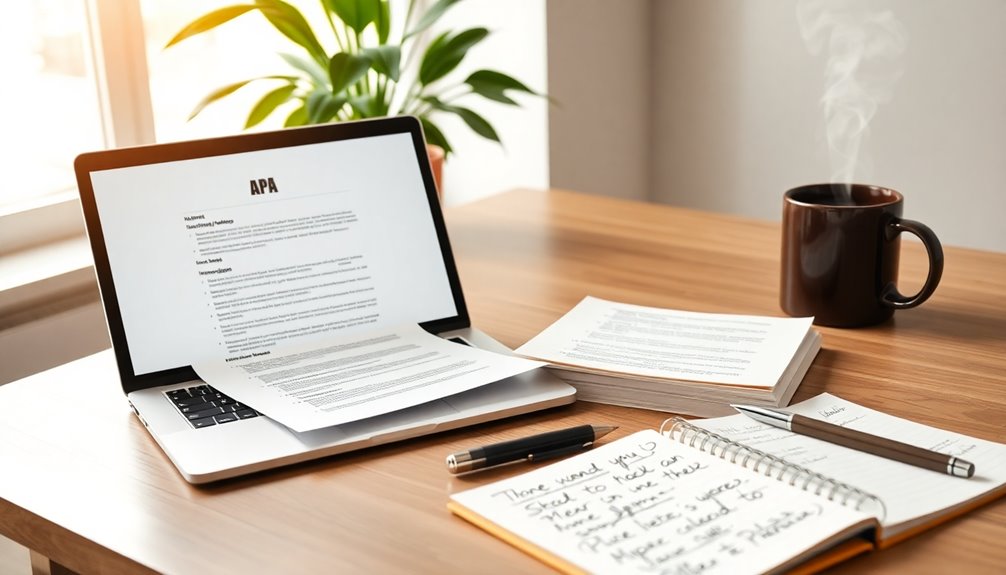
Presenting interview sources effectively sets the stage for your paper, making it easier for readers to grasp the relevance of the insights shared.
Start by introducing your interviewees, highlighting their qualifications and connection to the topic. This context helps your audience understand why their perspectives matter.
When you discuss the selection process, explain how you chose these individuals and the method of communication used. Consider including a brief rationale for why their insights are valuable.
By establishing credibility, you not only enhance your paper's authority but also engage your readers. Additionally, consider how the interviewees' experiences may relate to specific challenges faced during significant life changes, such as divorce.
Formatting Questions and Answers
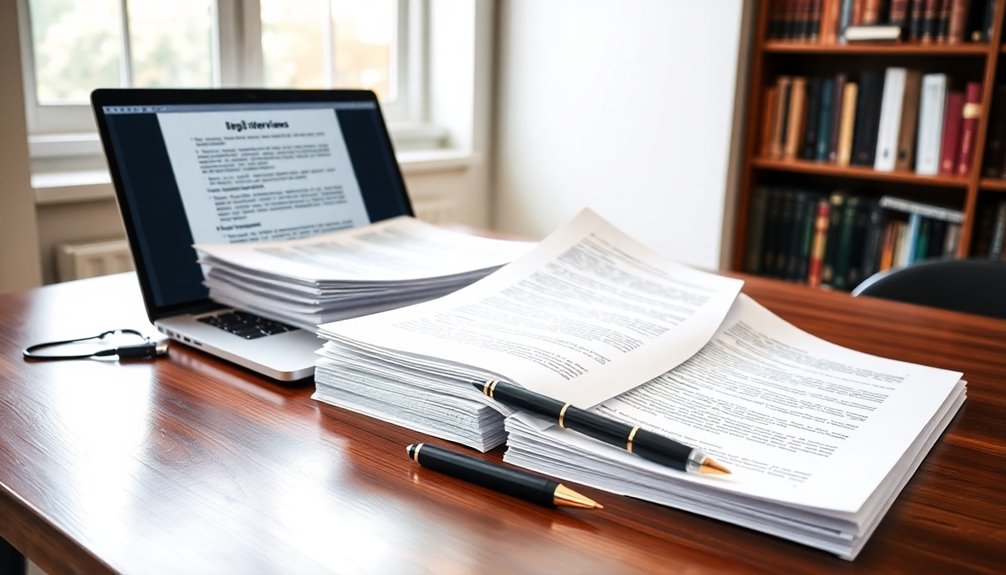
Once you've established your interview sources, the next step is to format the questions and answers clearly. Start by presenting each question as a direct or indirect quotation, ensuring it stands out.
Keep each question in its own paragraph to maintain clarity.
When it comes to responses, provide context to help your readers understand the interviewee's perspective. For answers longer than 40 words, use block quotations, ensuring you follow punctuation rules correctly.
Remember to include in-text citations immediately after each response, noting the interviewee's initials, the phrase "personal communication," and the date.
This structure not only enhances readability but also supports academic integrity in your interview paper.
Proper Citation Practices
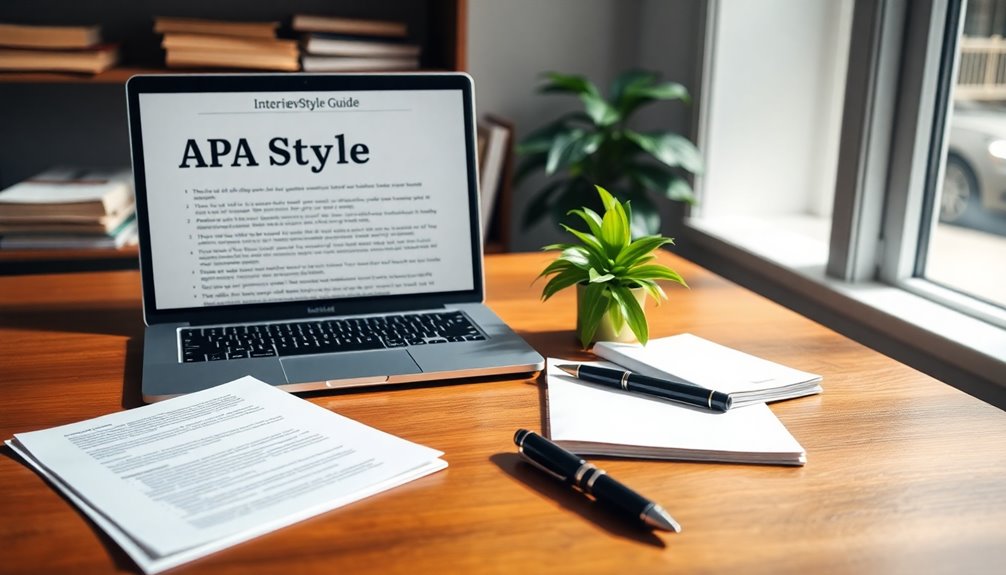
While understanding citation practices might seem tedious, it's crucial for maintaining academic integrity and giving credit to your sources. Proper citation not only enhances your credibility but also helps your readers trace the information back to its origin.
Here are some key points to remember:
- Always include in-text citations for direct quotes and paraphrased material.
- Use the correct format for personal communications, like interviews, specifying the interviewee's initials and date.
- Keep punctuation rules in mind, especially for block quotations.
- Verify that citations are accurate and align with the APA Style Guide to avoid plagiarism.
Following these practices will strengthen your paper and contribute to a more rigorous academic environment.
Compiling References Correctly
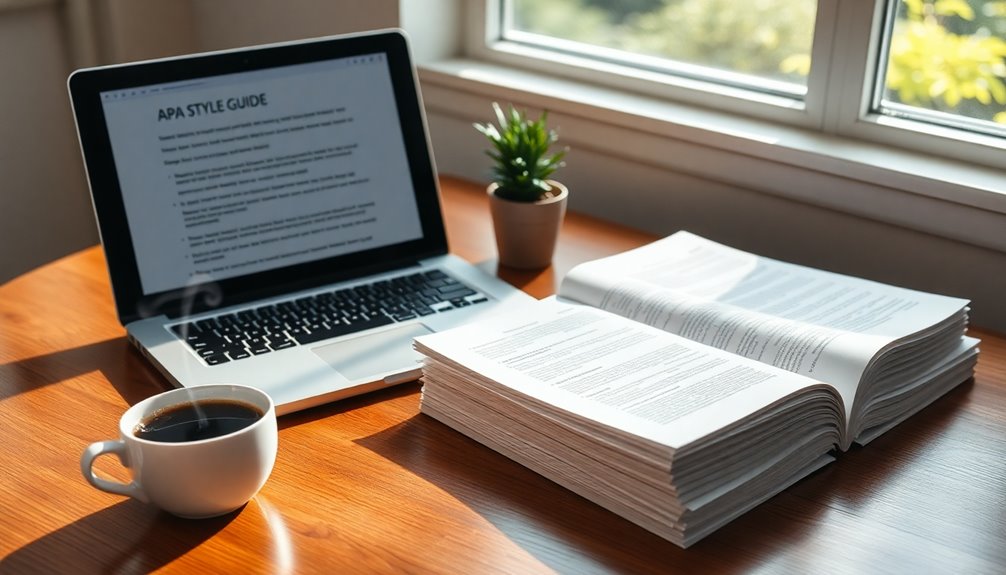
Compiling references correctly is essential for creating a credible and professional-looking interview paper. Start by listing all published sources you've used, ensuring they adhere to APA format.
Bold and center the word "References" at the top of the page. Organize your references alphabetically by the last name of the first author, applying hanging indentation for each entry.
Remember, unpublished interviews don't belong on this page, as they're cited in-text only. Pay attention to details, including punctuation and capitalization, to maintain consistency.
Double-check your formatting against the APA Style Guide to avoid errors. By meticulously compiling your references, you enhance the integrity of your paper and provide readers with a reliable resource list.
Frequently Asked Questions
How Do I Choose the Right Interviewee for My Paper?
Choosing the right interviewee for your paper involves identifying individuals with relevant expertise or experience related to your topic.
Look for professionals, scholars, or practitioners who can provide unique insights. Consider their communication style and comfort level with interviews, as this affects the quality of information you'll receive.
Make certain to research their background to guarantee their perspectives align with your thesis and the overall goals of your paper.
Can I Include Personal Opinions in an Interview Paper?
Yes, you can include personal opinions in an interview paper, but use them carefully. While your insights can provide valuable context, make sure they don't overshadow the interviewee's expertise.
Balance your perspective with their responses to maintain credibility. It's crucial to clearly differentiate between your opinions and the insights gained from the interviews, ensuring readers can discern the source of information and the relevance it has to your overall argument.
What if the Interviewee Prefers to Remain Anonymous?
If your interviewee prefers to remain anonymous, you can still convey their insights effectively.
You'll need to balance their confidentiality with the need for credibility. Instead of using names, refer to them by a title or role, ensuring readers understand their expertise.
This approach maintains the integrity of your paper while respecting their wishes.
Just remember, anonymity doesn't diminish the value of their contributions; it simply adds a layer of complexity to your writing.
How Do I Handle Conflicting Viewpoints From Interviewees?
When handling conflicting viewpoints from interviewees, you should present each perspective clearly and fairly.
Start by summarizing their arguments in separate sections, using direct quotes for authenticity.
Acknowledge the differences and explore the reasons behind them. This not only enriches your analysis but also shows your commitment to representing diverse opinions.
Conclude by reflecting on how these conflicting views contribute to a deeper understanding of the topic at hand.
Are There Specific Ethical Guidelines for Conducting Interviews?
Yes, there're specific ethical guidelines for conducting interviews. You should always obtain informed consent from your interviewees, ensuring they understand the purpose and how their information will be used.
Respect their privacy by keeping their responses confidential unless agreed otherwise. Be honest and transparent about your intentions, and avoid leading questions that might bias their answers.
Finally, show appreciation for their time and insights, fostering a respectful dialogue throughout the process.
Conclusion
Mastering interview papers not only boosts your research skills but also enhances your writing credibility. By following the APA Style Guide, you'll present your insights clearly and professionally. Isn't it exciting to think about how expert conversations can elevate your arguments? With the right structure and citation practices, you'll avoid common pitfalls and enrich your analysis. Embrace these techniques, and watch your academic and professional pursuits thrive as you reveal the potential of unpublished insights.
Eugene brings a fresh, dynamic voice to our platform as one of our talented Writers. Specializing in research-driven content, he explores the latest findings in psychology and personal growth, translating them into actionable insights for our readers. Eugene’s work is fueled by a curiosity about what makes us tick and a desire to help others unlock their potential.
